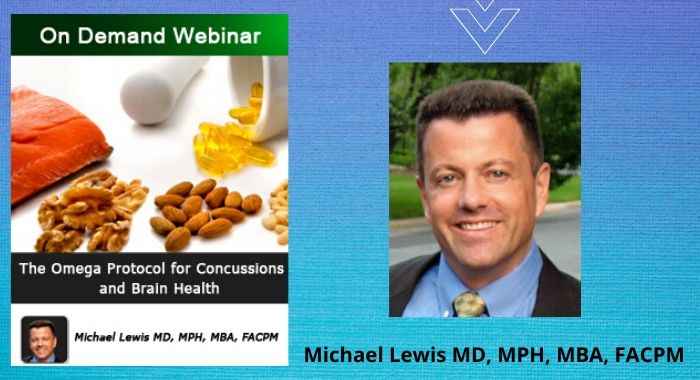
The Omega Protocol for Concussions and Brain Health
Learn about the role of Omega fatty acids and their importance and role of brain function specifically when an athlete has a concussion

The Omega Protocol for Concussions and Brain Health
Learn about the role of Omega fatty acids and their importance and role of brain function specifically when an athlete has a concussion
Michael Lewis MD, MPH, MBA, FACPM
What you will learn in this course:
- The brain needs to be saturated with high doses of omega-3s in order for the brain to have the opportunity to heal, even years after an injury.
- Omega-3s are not a drug and not a cure.
- Omegas may have a positive impact on neuroprotection of brain cells, neuroinflammation, and neuroregeneration.
- There is no downside to providing optimal levels of nutrition in order to give an athlete the best opportunity to return to prior level of function as quickly as possible.
- The Omega Protocol found on the website << http://www.brainhealtheducation.org/omega-3-protocol/ >> begins with fifteen (15) capsules a day divided into three doses of five (5) capsules (or liquid equivalent).
2 Credit Hour as Approved by Commission on Dietetic Registration (CDR)
CDR Performance Indicators: 1.1, 1.4, 1.6, 2.1, 2.2, 3.1, 3.2, 4.1, 4.2, 6.2, 6.3, 7.1, 8.2, 9.1, 9.4, 9.6, 10.1, 10.4, 11.1, 11.4
CDR Learning Codes: 2020, 2070, 2090, 2100, 2110, 3000, 3010, 3020, 3040,3060, 3070, 3100, 4060, 4170, 5000, 5005, 5020, 5080, 5090, 5170, 5285, 7130, 9020, 9030
CSSD Exam Competencies addressed:
- Analyze and interpret available data in the context of enhancing athletic performance and health.
- Explain how energy is stored in skeletal muscle and other tissues.
- Explain the use of fat during exercise training, competition, and recovery.
- Describe the potential risks of excessive vitamin and mineral supplementation on health and performance.
- Describe antioxidant function in relation to exercise, recovery, and long-term training adaptations.
- Describe the efficacy of vitamin and mineral supplementation on health and performance
- Evaluate special issues related to fat intake, fat storage, and health.
- Evaluate effects of inadequate vitamin and mineral status on health and performance.
- Discuss the risks of hyponatremia on training and performance.
- Evaluate supplements and ergogenic aids using evidence-based analyses (e.g.,effectiveness, quality control, safety, and legality).
- Evaluate dietary supplement use.
- Advise clients regarding supplements and ergogenic aids using evidence-based analyses (e.g., effectiveness, quality control, safety, and legality).
- Demonstrate knowledge of rules and regulations of athletic governing bodies regarding banned drugs and restricted substances.
- Estimate total energy expenditure in active individuals and special populations
- Design nutrition strategies for individuals and/or groups for recovery from sports injuries or overtraining.
- Apply behavior modification coaching and counseling techniques.
- Design nutrition strategies for active individuals with acute or chronic illness and/or injury.
- Design nutrition strategies for active children, adolescents, and young adults.
1
The Omega Protocol for Concussions and Brain Health
$19.99
Total due
$19.99
___MESSAGE___
___MESSAGE___